
Gifts from Animals to People
Dogs, cats, and other pets, as well as farm animals such as cows and horses, are familiar parts of our lives. With the advent of zoos, moreover, animals that were once seen only in the wild can now be observed quite close-up. We all go through life with various relationships to animals. In this issue, we report on the relationships between people and animals in Japan through a close look at the country’s zoos and pets.
Life in Zoos
History of Japanese Zoos
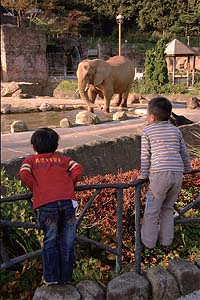
Ueno Zoo, the first zoo in Japan, was founded in Tokyo in 1882. Zoos subsequently opened in big cities such as Kyoto and Osaka. After World War II, zoos were built all around the country, creating the so-called “zoo boom.”
Every rare animal to arrive in Japan captured public attention. In the 1990s, however, the number of visitors to zoos dropped and some were forced to shut down. With a declining birthrate, the number of children in Japan has decreased and there are also many more entertainment options available today. Some say that zoos lost their popularity because of the unappealing way the animals were seen, confined to small and unattractive cages.
In recent years, however, we have witnessed a renewed interest in zoos. Asahiyama Zoo, which has employed a method of showing the animals that brings out their best side, was responsible in no small part for bringing about this revival. Other zoos followed its lead in implementing better ways of exhibiting animals. Zoos are changing from what were once
mainly facilities for entertaining children to places where both children and adults can enjoy learning about animals.
Today, there are close to 100 zoos throughout the country. Ueno Zoo (Tokyo), the busiest one in Japan, has 3.5 million visitors a year.
| History of Japanese Zoos in Japan | |
|---|---|
| 1882 | Japan’s first zoo, Ueno Zoo, opens in Tokyo |
| Early 1900s | Zoos open in large cities such as Kyoto and Osaka |
| Mid-1900s | Zoo animals are ordered put down during World War II |
| 1948 | “Children’s Zoo” (petting zoo) opens at Ueno Zoo |
| 1949 | 30,000 children visit Higashiyama Zoo on the “elephant trains” |
| 1950 | Ueno Zoo operates a “moving zoo” across the country, leading to a nationwide “zoo boom” |
| Mid-1950s | Zoos open around the country |
| 1972 | Pandas arrive for the first time in Japan, creating a panda frenzy. On the first day to see the pandas at Ueno Zoo, the line of visitors was two kilometers long. |
| 1980s | Recreation, education, environmental conservation, and research become widely recognized as part of the mission of a zoo |
| 1984 | Koalas arrive for the first time in Japan, creating a koala boom |
| Early 1990s | Increase in entertainment options and declining birthrate lead to a drop in zoo visitors |
| Early 2000s | Asahiyama Zoo gains popularity with its “ethological exhibits” |
Children’s Petting Zoos
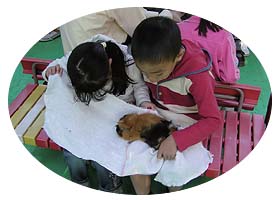
|
In 1948, Ueno Zoo opened the Children’s Zoo, where children are given the chance to pet animals. Today, seven out of every ten zoos in Japan have such petting zoos. In addition, some local governments run parks where visitors can play with animals. The purpose of these facilities is to familiarize children with animals, allowing them to gain a better understanding of life. The most common animals at such petting zoos are rabbits, guinea pigs, and goats. <-“Children’s zoos” where children are allowed to touch the animals are very popular. |
Zoo Animals Messengers of Peace
After World War II, learning of children’s hopes to bring an elephant to Ueno Zoo, Prime Minister Jawaharlal Nehru of India presented Ueno Zoo with an elephant named after his daughter, Indira, in 1949. In a letter he sent to the children of Tokyo, Prime Minister Nehru said, “. . . I hope that when the children of India and the children of Japan will grow up, they will serve not only
their great countries, but also the cause of peace and cooperation all over Asia and the world. So you must look upon this elephant, Indira by name, as a messenger of affection and goodwill from the children of India . . .”
In 1972, the year Japan and China normalized diplomatic relations, China presented Japan with two giant pandas, Kan Kan and Ran Ran, as symbols of friendship.
The Japanese people understood the message behind these gestures, and the animals were well loved. Many people did feel affinity for each other’s countries through these animals.
For Happier Lives in the Zoo
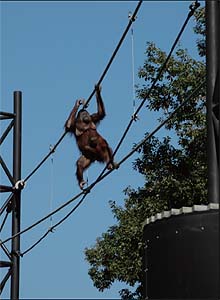 The orangutans at Tama Zoological Park (Tokyo) display their skills on special apparatus rigged in their pen. Visitors can watch the orangutans swing on a 150-meter long rope hung 15 meters above the ground.->
The orangutans at Tama Zoological Park (Tokyo) display their skills on special apparatus rigged in their pen. Visitors can watch the orangutans swing on a 150-meter long rope hung 15 meters above the ground.->
Research is being conducted to enrich zoo life, which can easily become a monotonous routine. Various methods have been tried. Why do some animals exhibit abnormal behavior in zoos? One explanation is the lack of things to do. Animals in the wild must deal with harsh natural conditions to acquire food. For example, polar bears cover great distances looking for food, spending the majority of each day hunting. In a zoo, where they are fed at set times everyday, however, there is nothing for them to do. To remedy this lack of activity, their keepers sometimes hide apples and bananas in blocks of ice or conceal the food in different parts of the pens each day. This means the polar bears have to expend some time and energy in finding their food.
In addition to zoos that take steps to ensure that animals are getting what they need, certain non-profit organizations keep tabs on zoos to make sure they are providing healthy living environments for the animals. The Network for Zoo Enrichment is an NPO dedicated to promoting zoos not only as places for enjoyment, but as places for examining the relationship between animals and humans. It supports zoos in their efforts to improve their environments, and since 2002, has been presenting the Enrichment Award to zoos that have demonstrated their commitment to this cause.
A Place to Learn about Life
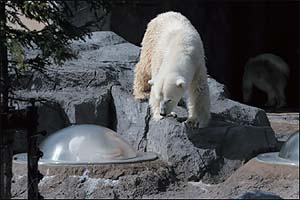 A clear capsule juts out of the ground in the bears’ pen. Visitors can witness up close the dynamic power of the polar bear. 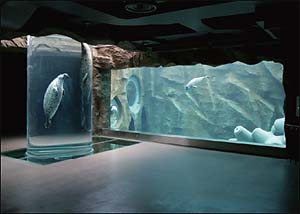 Seal swimming in a cylindrical part of its tank. © Asahiyama Zoo |
Asahiyama Zoo in Hokkaido has attracted quite a bit of attention in the past several years. Japan’s northernmost zoo, Asahiyama first opened in 1967. When the number of visitors dropped from nearly 700,000 in the 1970s to 250,000 in the 1990s, Asahiyama Zoo was criticized as having lost its public purpose. The zoo’s director, Kosuge Masao, studied the role of zoos and arrived at the conclusion that they should be places where visitors gain an appreciation for the wonders of animal life. To achieve this purpose, Asahiyama Zoo decided to employ the “ethological exhibit” method of showing the animals. Based on the understanding that each animal has its own behavior and characteristics that are unique and compelling to visitors without relying on tricks that people train them to do, this display format seeks to put the animals’ innate attributes on display. For example, in a cylindrical part of the tank, visitors can observe up close a seal’s skill at maneuvering vertically in a narrowly confined space. This new method of exhibiting animals has led to renewed interest in the zoo, which attracted over three million visitors in 2006, second only to Ueno Zoo. |
“Faithful Elephants” and the “Elephant Train”
|
Zoos were the site of many tragedies during World War II. In addition to the lack of food, the military ordered zoos to slaughter animals to prevent them from escaping and hurting people, and many animals were killed as a result. However, two elephants at Ueno Zoo refused to eat the poison-laced feed they were given. Instead, they performed tricks to try their keepers to give them their usual food. Kawaiso na zo (Faithful Elephants) is the story of these elephants. After World War II, the only elephants that remained in Japan were the two at Higashiyama Zoo in Nagoya. Special trains called “elephant trains” were arranged to bring children from all over the country to Higashiyama Zoo. Over 30,000 children took these trains to visit the elephants. Zo-ressha ga yattekita (Here Comes the Elephant Train) is a book about this story. These two picture books teach us about the preciousness of life, the responsibilities human beings have toward animals, and the gifts animals pass on to our children. |
|
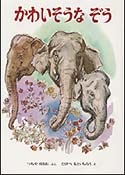 Kawaiso na zo © Yukio Tsuchiya & Motoichiro Takebe, 1970. Published by KINNO-HOSHI SHA Co., Ltd. |
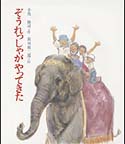 Zo-ressha ga yattekita © Takashi Koide & Genjiro Mita, 1983. Published by IWASAKI Publishing Co., Ltd. |
|---|---|
Animal Companions
Popular Pets
Nearly 40 percent of all families in Japan have pets. More families in provincial areas own pets than in large cities like Tokyo or Osaka. Pets range from dogs, cats, birds, rabbits, and hamsters to fish, various kinds of reptiles, and insects, but dogs and cats are the most popular.
Urban families and even single apartment-dwellers who keep dogs and cats as indoor pets have recently increased. Few apartments permitted residents to have pets a decade ago, but today, over half of apartments allow residents to keep animals. In addition, there has been a rise in pet hotels, and hotels, cafes, and restaurants that allow customers to bring their pets with them.
As people have come to accept that dogs must be house-trained in order for them to be accepted by other people in the community as
bona fide family members, the number of dog training schools has also risen.
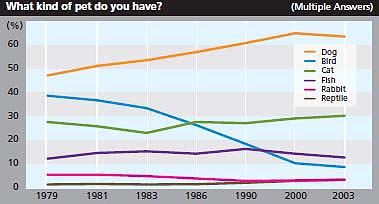
Source: Cabinet Office, “Basic Poll on Animal Protection,” 2003
Reasons for Owning Dogs
The psychological and physical benefits of interacting with animals have become widely accepted. Many nursing homes and other such care facilities employ animal therapy, creating opportunities for clients to play with animals.
According to a certain study, many families say they acquired pets because their children had asked for them. They add, though,
that the pets have had the effect of calming their families and increasing conversation among family members. Moreover, in urban
areas where community ties are sometimes weak, pets have been effective in creating opportunities for neighbors to communicate
with each other.

Source: Pet Food Manufacturers Association, “2006 National Survey on the Percentage of Pet Ownership”
From Stray Cats to Community Cats
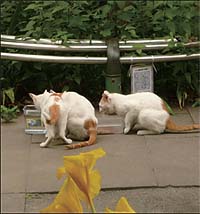 <-Community cats gathering at a feeding station in a park.
<-Community cats gathering at a feeding station in a park.© Shinjuku Ward Public Health Center
As the number of pet dogs and cats increased, so did the number of abandoned pets. This causes various problems; there are conflicts between people who, unable to turn a blind eye to strays, feed them, and others who are troubled by strays leaving droppings and the resulting odors on their property. Prefectural animal protection centers (dobutsu aigo senta) pick up stray dogs and cats, but they are put down if no one adopts them after a certain period of time, 400,000 every year, it is said.
An increasing number of communities have launched “community cat” activities as an alternative to killing strays while keeping them from inconveniencing residents. Local residents work together in getting the cats neutered, feeding them at specific times and places, and cleaning the places where they defecate. Some local governments provide these volunteers with funds for sterilization operations. Shinjuku ward, Tokyo, is one of them.
The Shinjuku ward public health center has established a forum for those who feed stray cats, those who suffer damage to their property by strays, and others in the community to identify and discuss the problems surrounding stray cats. “The problem of stray cats often turns out to be a problem between people,” says Takagi Yuji of the Shinjuku ward public health center. “That’s why we organize these discussions. And only when everyone in the community—not just the people who like cats—are involved
can we say that our ‘community cat’ activities have succeeded.”
School Pets
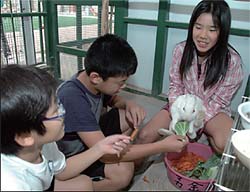 Children take turns cleaning the cage and feeding the animals kept at their elementary school.->
Children take turns cleaning the cage and feeding the animals kept at their elementary school.->
Many elementary schools in Japan keep pets such as rabbits. Traditionally, animals were kept as a part of science classes, but nowadays, the emphasis is on teaching students the value of life. Usually, students on the “animal care committee”* take care of these animals. In some schools, however, the entire student body participates in these chores. There are some schools where individual homerooms have pet hamsters or goldfish.
*Older elementary school children are members of at least one committee (kakari). In addition to the animal care committee, there are committees such as the “environmental beautification” committee, AV committee, newspaper committee, and health committee.
Popular Dogs
The dog breeds that are most popular differ from year to year. In recent years, small dogs have consistently been the most popular. What kinds of dogs do your friends and family have, and why?
Breeds of Registered Dogs
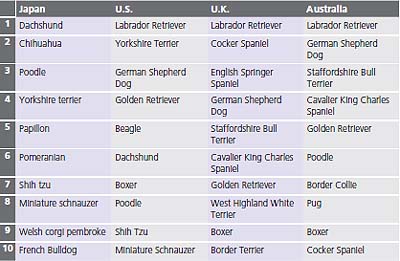
Source: Japan Kennel Club 2006 (Japan), American Kennel Club 2006 (U.S.), The Kennel Club UK 2006 (U.K.), Australian National Kennel Council 2006 (Australia)
Original text : Takarabako No.14 “Japanese Culture Now” December 2007.
Copyright(C)1997-2008 The Japan Forum. All rights reserved.
Send feedback to forum@tjf.or.jp